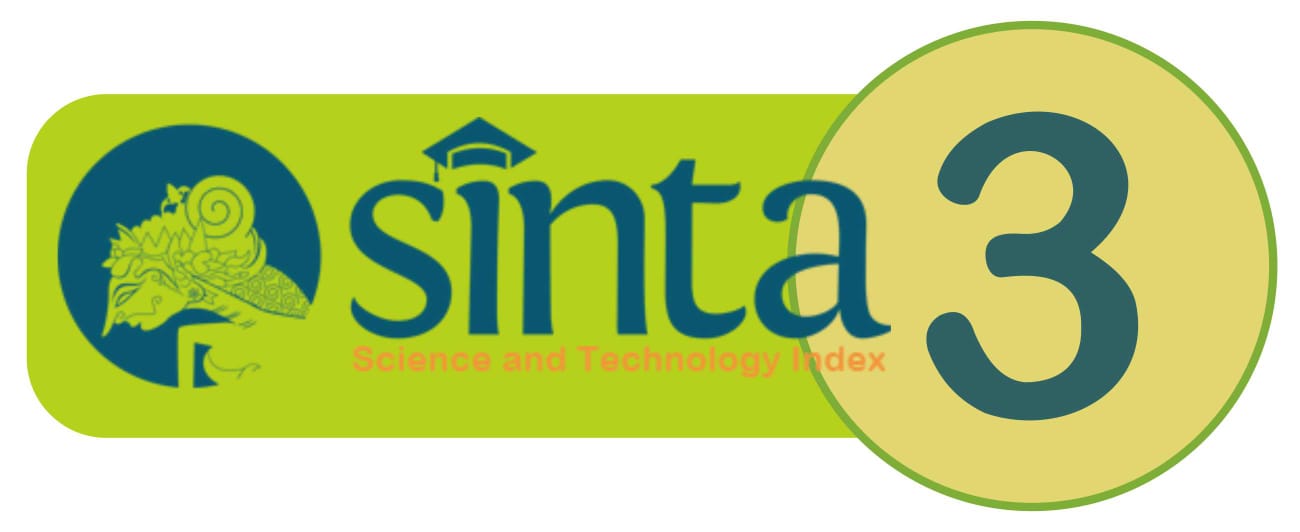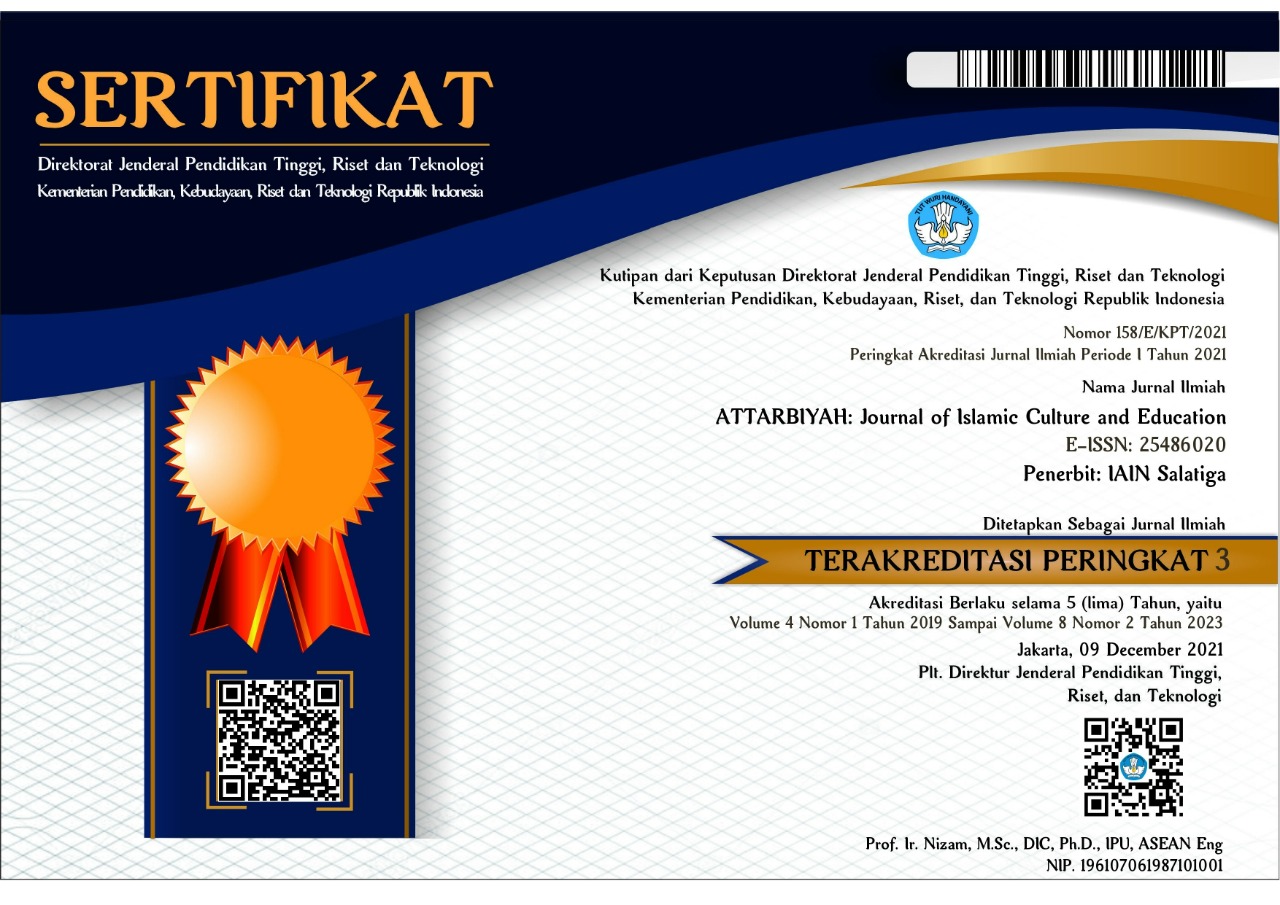The modernization practices of pesantrens in Salatiga
Abstract
Keywords
Full Text:
PDFReferences
Adamson, Clarissa. (2007). Gendered Anxieties: Islam, Women’s Rights, and Moral Hierarchy in Java. Journal Anthropological Quarterly. vol.80. no.1, 5-37.
Arifin, M. (1991). Kapita Selekta Pendidikan (Islam dan Umum). Jakarta: Bumi Aksara.
Azra, Azyumardi. (1999). Pendidikan Islam Tradisi dan Modernisasi Menuju Milenium. Jakarta: Logos Wacana Ilmu.
Depdikbud RI. (1989). Kamus Besar Bahasa Indonesia . Jakarta: Balai Pustaka.
Dhofier, Zamakhsyari. (1985). Tradisi Pondok Pesantren: Studi tentang Pandangan Hidup Kiai. Jakarta: LP3ES.
Engku, Iskandar dan Siti Zubaidah. (2014). Sejarah Pendidikan Islam. Bandung: PT Remaja Rosdakarya.
Hellman, Jorgen. (2004). Ramadhan Fasting at a Pesantren in West Java. Southeast Asian Islam, vol.4, no. 4, 17-19.
Ismail, Faisal. (1998). Paradigma Kebudayaan Islam: Studi Kritis dan Refleksi Historis. Yogyakarta: Titian Ilahi Press.
Izfanna, Duna dan Hisyam, Nik Ahmad. (2012). A Comprehensive Approach in Developing Akhlaq: A Case Study On The Implementation Of Character Education at Pondok Pesantren Darunnajah. Multicultural Education and Technology Journal, vo. 6, No. 2, 77-86.
Lembaga Riset Islam (Pondok Pesantren Luhur). (2011). Sejarah dan Dakwah Islamiyah Sunan Giri. Malang: Panitia Penelitian dan Pemugaran Sunan Giri Gresik.
Madjid, Nurcholis. (1997). Islam Kemodernan dan Keindonesiaan. Bandung: Mizan.
Miarso, Yusufhadi. (2007). Menyemai Benih Teknologi Pendidikan, cet III. Jakarta: Kencana Prenada Media Group.
Moleong, Lexy J. (2009). Metodologi Penelitian Kualitatif, Bandung: PT Remaja Rosdakarya.
Nasution, Harun. (1975). Pembaharuan dalam Islam, Sejarah Pemikiran dan Gerakan. Jakarta: Penerbit Bulan Bintang.
Nasution, M. N. (2004). Manajemen Transportasion. Bogor: Ghalia Indonesia.
Nasution, R.E. Elson. (2010). Islam ‘secularism’ and the state in contemporary Indonesia. Australian Journal of International affairs, vol. 64, No. 3, 328-343.
Nasution, Zulkarimein. (1989). Teknologi Komunikasi dalam Perspektif Latar Belakang dan Perkembangan. Jakarta: Lembaga Penerbit Fakultas Ekonomi UI.
Nawawi, Hamdan. (1995). Metode Penelitian Bidang Sosial. Yogyakarta: Gajah Mada University Press.
Nizar, Samsul. (2011). Sejarah Pendidikan Islam (Menelusuri Jejak Sejarah Pendidikan Era Rasulullah sampai Indonesia). Jakarta: Kencana.
Phol, Florian. (2006). Islamic Education and Civil Society: Reflections on the Pesantren Tradition in Contemporary Indonesia. Journal Comparative Educational Review, vol.50, no.3, 389-409.
Qomar, Mujamil. (2005). Pesantren dari Transformsi Metodologi Menuju Demokrasi Isntitusi. Jakarta: Erlangga.
Rahim, Husni. (2001). Pembaharuan Sistem Pendidikan Nasional: Mempertimbangkan Kultur Pondok Pesantren. Jakarta: Logos Wacana Ilmu.
Sirry, Mun’im. (2010). The Public Expression of Traditional Islam: the Pesantren and Civil Society in Post-Suharto Indonesia. Journal The Muslim World, vol.100, no.1, 60-77.
Sukmadinata, Nana Syaodih. (2013). Metode Penelitian Pendidikan, cet. Bandung: Remaja Rosdakarya.
Suseno, Franz Magnis. (2001). Etika Dasar: Masalah-Masalah Pokok Filsafat Moral. Yogyakarta: Kanisius.
Wiryokusumo, I. & Mulyadi, U. (1988). Dasar-Dasar Pengembangan Kurikulum, Jakarta: Bina Aksara.
Yasmadi. (2002). Modernisasi Pesantren, Kritik Nurcholis Madjid Terhadap Pendidikan Islam Tradisional, Jakarta: Ciputat Press.
DOI: https://doi.org/10.18326/attarbiyah.v2i2.153-173
Refbacks
- There are currently no refbacks.

ATTARBIYAH: Journal of Islamic Culture and Education by http://attarbiyah.iainsalatiga.ac.id/ is licensed under a Creative Commons Attribution-ShareAlike 4.0 International License
----------------------------------------------------------
ATTARBIYAH : Journal of Islamic Culture and Education IAIN SALATIGA p-ISSN: 0215-9996, e-ISSN: 2548-6020



